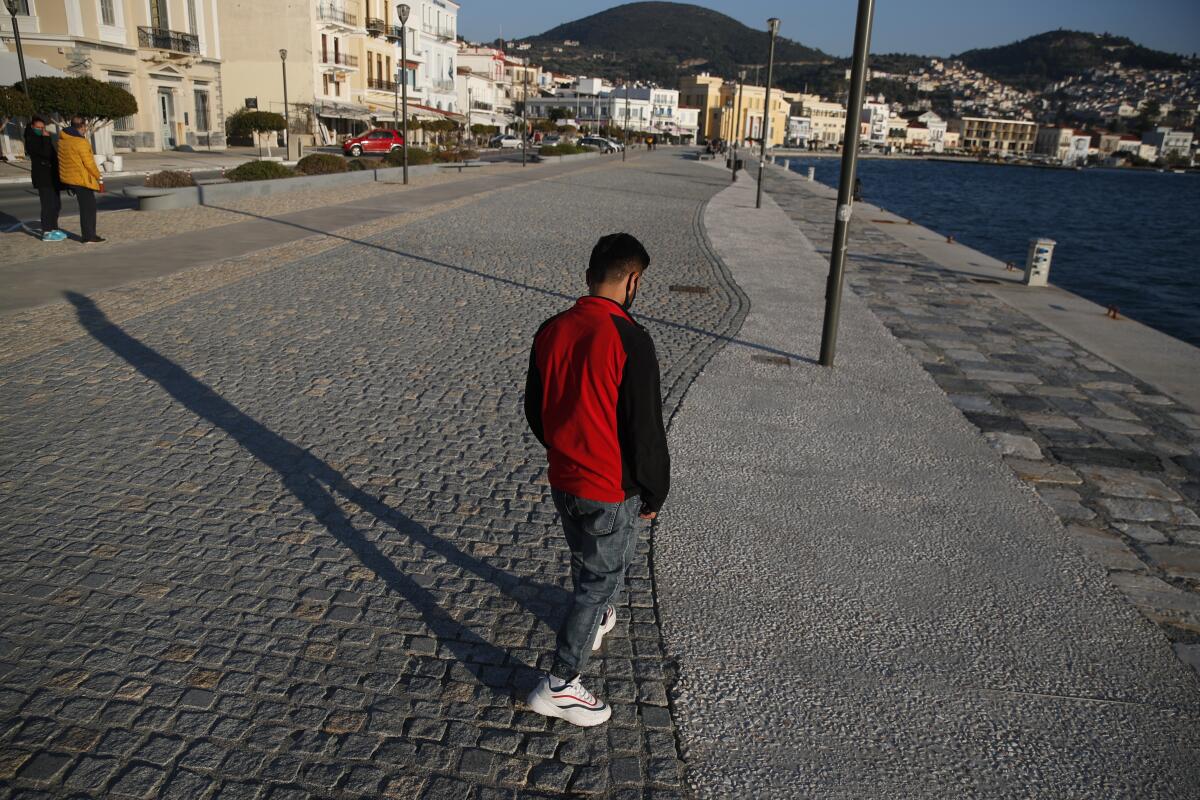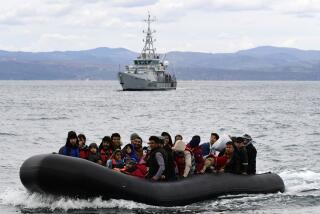Migrant father charged in son’s drowning death on journey to seek asylum in Greece

VATHY, Greece — On a pine-covered hill above the sparkling Aegean Sea lies a boy’s grave. His first boat ride was his last — the sea claimed him before his sixth birthday.
“He drowned in a shipwreck,” his gravestone reads. “It wasn’t the sea, it wasn’t the wind, it is the policies and fear.”
Those migration policies are being called into question in the case of the Afghan boy’s 25-year-old father, who is charged with child endangerment for taking his son on the journey from Turkey to Greece and faces up to 10 years’ imprisonment.
This is believed to be the first time in the European Union that a parent faces prosecution for their child’s shipwreck death in the pursuit of a better life in Europe.
The father, divorced and raising his son alone, said he decided to leave Turkey after his asylum application there was rejected twice because he feared deportation to Afghanistan.
“I didn’t come here for fun. I was compelled,” he said. “I decided to go for the future of my son, for my future, so we can go somewhere to live, and my son can study.”
Now, he says, he often thinks of killing himself. He agreed to speak to the Associated Press on condition he only be identified by his initials, N.A., and that his son wouldn’t be named.
“Without him I don’t know how to live,” he cried. “He is the only one I had in my life. All my hopes were him.”
It isn’t entirely clear why Greek authorities took the extreme step of charging this man when so many others have been in his place before.
Migration Minister Notis Mitarachi said the case doesn’t herald any change in Greece’s migration policy.
“If there is the loss of human life, it must be investigated whether some people, through negligence or deliberately, acted outside the limits of the law,” Mitarachi said, adding this was on a case-by-case basis.
He noted asylum seekers’ lives aren’t in danger in Turkey.
“The people who choose to get into boats, which are unseaworthy and are driven by people who have no experience of the sea, obviously put human lives at risk,” he said.
On the EU’s border, Greece has been on the front line of Europe’s migration crisis. From 2014 to 2020, more than 1.2 million people used the eastern Mediterranean route to Europe, according to UNHCR figures. More than 2,000 died or went missing.
Last March, as Greek-Turkish relations soured, Turkey announced its borders to the EU were open, sending thousands of migrants to the Greek border. Greece accused Turkey of weaponizing migrants’ desperation. Aid groups and asylum seekers have also reported that in response Greece has carried out illegal deportations without allowing asylum applications. Greece vehemently denies the claims.
The AP pieced together what happened with N.A. and son from legal documents and interviews with people involved in the case.
Their journey began in the Turkish town of Izmir. The 24 Afghan passengers included 29-year-old Ebrahim Haidari, who remembers the boy as an intelligent child who chatted with other passengers and joked with the smugglers in Turkish. He was struck by the father and son’s close relationship.
On the night of Nov. 7, the group was driven to the Turkish coast. The sea wasn’t calm, but the smugglers insisted the weather would improve.
Unlike the adults, the boy wasn’t scared. He was excited about his first boat ride.
The smugglers forced the passengers into the inflatable dinghy and made one of them drive. As the hours passed, the sea grew rougher and the boat took on water. Terrified of dying, they turned toward the first land they could see. But rocks near the shore ripped the dinghy, throwing them overboard.
As they tumbled into the inky sea, the child slipped out of his father’s embrace. There was chaos. The father couldn’t see or hear his son.
A boat eventually appeared with a searchlight. The survivors waved and shouted, but it didn’t stop. A second vessel appeared, but the same thing happened.
The father is certain the crew saw them, but didn’t help.
Legal documents show the Samos coast guard arrested the father for “exposing his minor son to danger during the attempted illegal entry into the country by sea.”
Greece’s Shipping and Island Policy Ministry, under whose jurisdiction the coast guard falls, didn’t grant an interview request with Samos coast guard officials. However, an official outlined authorities’ account of events, speaking on condition of anonymity.
The official said the coast guard was alerted to the possible arrival of migrants at the tip of an uninhabited peninsula and immediately dispatched two vessels. But they saw nobody when they arrived. Hours later, one of the vessels spotted a woman behind a rock and discovered the boy’s body nearby while rescuing her. The father was found several hours’ walk away, with another nine people.
“If you have a dead child, you try to figure out who he was with,” the official said. “It’s different when you have relatives there helping, and different when you find them alone.”
The indictment accuses the father of “leaving your ... child helpless” and putting him in an unseaworthy boat in bad weather.
Nick van der Steenhoven of the refugee rights charity Choose Love notes that asylum seekers have little choice in timing.
“These people have to rely on smugglers, and these smugglers decide when and where people take these journeys,” he said. The father and son “became victim of the failure of the European Union to provide safe and legal routes.”
The father’s defense lawyer, Dimitris Choulis, is filing an official application requesting an investigation into the coast guard’s actions. The father, he said, is convinced his son could have been saved if one of the first two boats had stopped.
Choulis considers the charges “the product of panic and not the product of some broader policy …. But automatically we are creating one more obstacle to these people to claim asylum.”
Theodora Tongas of the Associated Press contributed to this report.
More to Read
Sign up for Essential California
The most important California stories and recommendations in your inbox every morning.
You may occasionally receive promotional content from the Los Angeles Times.










